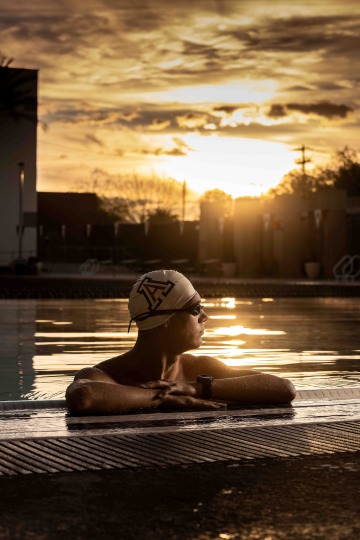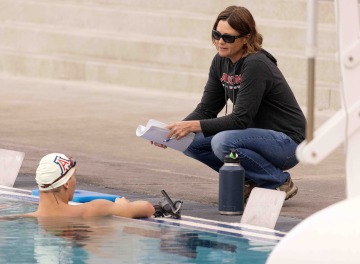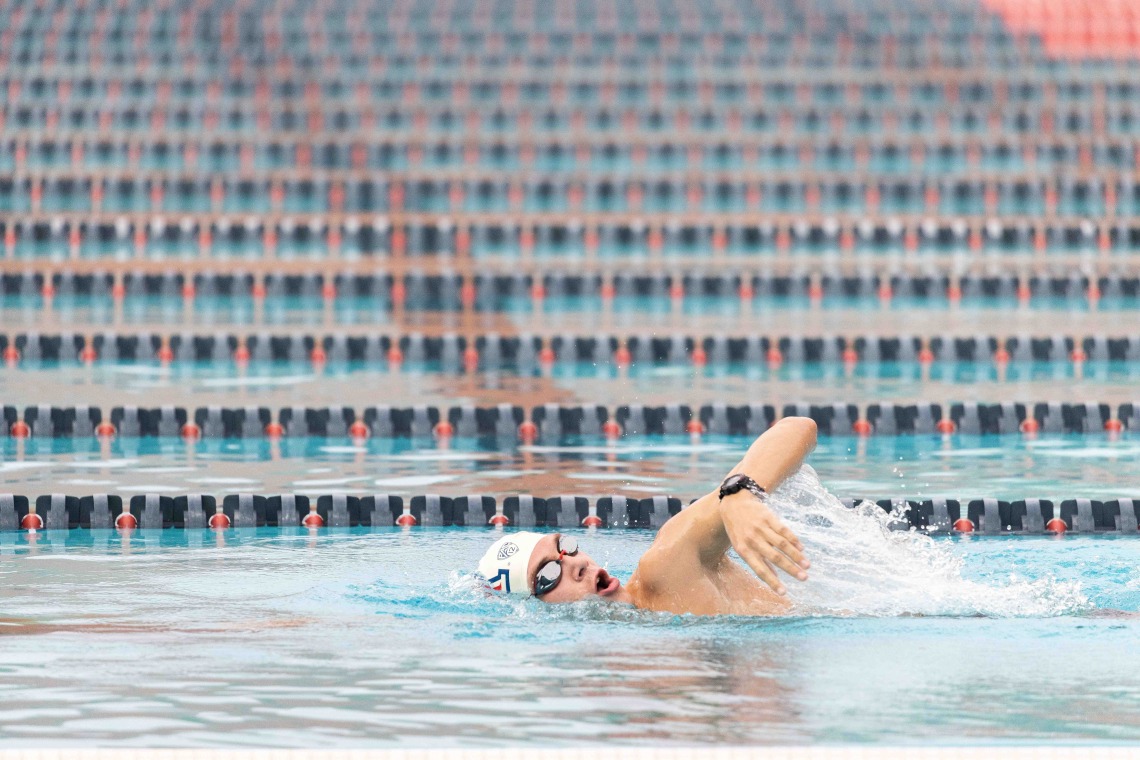Open Waters
Adaptive athletes bring their sports dreams to Arizona’s para swimming program.

Jon Trawick, a member of Arizona's para swimming team.
Photos: Chris Richards
Jon Trawick has undergone 19 spinal surgeries, about one for each year of his life. The aspiring Paralympian, whose main diagnosis is cerebral palsy, has an L4/L5 lumbar fusion, which reduces his mobility, balance and fine motor skills. He can’t swim the butterfly — and the breaststroke, he says, produces “a lot of pain and pressure.”
But Trawick can swim both the backstroke and the freestyle, and his life is defined not by his disability but by his expanding confidence in the pool. That truth likely holds for many members of the Arizona para swimming team, which is part of the university’s adaptive athletics program — the largest and most successful program of its kind in the country.

Trawick chats with coach Laura Utsch at a practice.
“While I do have a lot of work to do, a lot of who I am is because of para swimming,” says Trawick, clad in a T-shirt reading “Positive Athlete” before an early fall practice at the Student Recreation Center. “Because I’m an athlete, and I’ve had to manage my time. I’ve had to be in good shape. I’ve had to make friends.”
Trawick began swimming in the seventh grade, after one of his surgeries. He’d been doing aquatic physical therapy, which was easier on his legs and back than dryland exercises. Seeing his comfort in the water, his physical therapist encouraged him to try out for the team at his Georgia high school. Trawick approached the coach, saying, “I’ve never swum before, and I’m disabled. Are you willing to give me a shot?”
The answer was yes. And “from there,” Trawick says, “I just got better and better.”
Last summer, the neuroscience major moved across the country to join a team that coach Laura Utsch, a former Brigham Young University backstroker, emphasizes is “like any other,” at least in the way of habits and goals. “We take each individual where they are,” she says, “and work hard and try to get better.”
Even so, Utsch acknowledges her team’s pride of place in history.

Trawick swims both the freestyle and the backstroke.
Arizona’s collegiate para swimming program is the first in the nation, and for now, it is also the only. Founded in 2021, the 12-member team competes in meets put on by U.S. Paralympics Swimming — like the California Classic held in Yucaipa last September, where Utsch’s roster was by far the largest. Most of the athletes at the classic, Utsch says, came with a single teammate or by themselves.
Arizona’s team — which today has 10 student-athletes, two of whom are para triathletes, and two community members — was in about the same place as recently as 2022, when three swimmers made up the roster. Trawick was part of the program’s first recruiting class. Now, “the swimmers have other swimmers to make a team where they can belong,” Utsch says. “It’s hard to feel like you’re part of something when you’re the only one in it.”
Utsch founded the Tucson nonprofit Find Your Fins in 2014, offering free and low-cost swim lessons to veterans, people with disabilities and people with addictions. Through her decades in the pool, she understands the transformative impact that swimming can make in a person’s life. Even if student-athletes like Trawick hope to someday reach the Paralympics, she also just wants them to receive water’s gifts.
“Swimming is important for anyone, but especially people with disabilities,” Utsch says. “Water offers us so many great things. Freedom — everyone who swims says water is a place of freedom. It takes away gravity. It takes away so many things that are on land.
“It's just forgiving. It’s a supportive and forgiving place.”
With her team, the coach focuses on form, not lap times. Many of her swimmers have, in the past, had to sacrifice technique to try to keep up with their able-bodied teammates. Trawick, for one, was the only adaptive athlete on his high school team. Now, Utsch is slowing things down so that he can later speed up. “She says, ‘Don’t worry about speed — figure out control,’” he says. “Because if you control your stroke, you’re going to get faster anyway.”
The coach has her eyes on the future in more ways than one. She is careful to note that while the team makes a profound difference in her swimmers’ lives, there is distance to travel yet in leveling the playing field for adaptive athletes. She coaches the team alone, for instance, and describes herself as “super part time.” The program also is not funded at the same level as Arizona’s able-bodied teams. “People with disabilities have massive hurdles daily,” Utsch says. “And the disparity continues right here.”
Nonetheless, that the team exists at all has changed outcomes for Trawick and others. Its latest member, Mehraneh Mohseni Zadeh Harouzi, has told Utsch that she feels an excitement about swimming that she hasn’t felt about anything aside from her move to the United States, which came in 2020.
Trawick, for his part, has certainly pushed into open waters — into a space he never expected to reach. At the Ron Johnson Invitational, a U.S. Masters meet held at Arizona State in November, he set personal bests in the 50- and 100-meter freestyle. And at Arizona, he receives tuition assistance, as do all Wildcat adaptive student athletes.
“I didn’t think I was going to be doing any sports in college, but then Arizona reached out,” he says. “Not only did that allow me to go to college but it allowed me to go to college and do what I love.”
To support the para swimming team, visit give.uafoundation.org/paraswimming.
